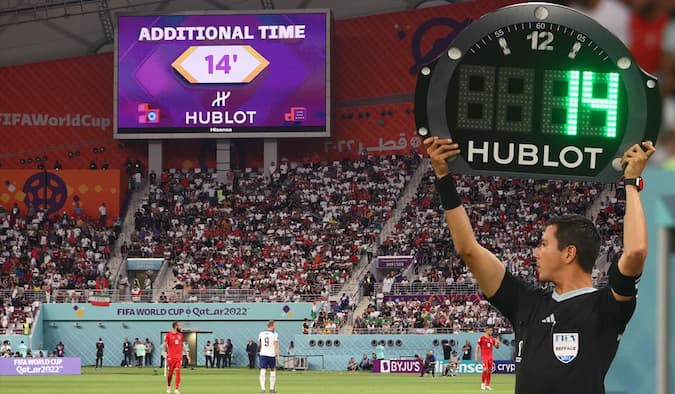In 2022 the first winter World Cup stamped its influence on domestic European leagues. The likes of the Premier League had to go on shutdown because of the international event in Qatar.
Strangely, halfway through a season domestic football betting at some bookmakers went into some kind of hibernation. But the advent of the World Cup in December with all the UK football betting offers raised some further interesting points about time, beyond the calendar schedule.
Added Time Changes
In Qatar, the timekeeping by officials during fixtures raised an eyebrow or two. Suddenly eight, nine minutes and more were being flashed up on the Fourth Official’s board at the end of a half.
In England’s opening match against Iran, there were a total of 27 added minutes across the two halves. It was something that most fans were unprepared for.
Read More:
View this post on Instagram
Why FIFA Changed
Pierluigi Collina, arguably the greatest referee ever, who is the head of FIFA referees, wanted to ensure that matches weren’t losing time at the 2022 World Cup. So the handling of time got a little more strict.
It often feels in Premier League matches like an arbitrary three to four minutes at most are put on the board. Five or six minutes generally signals outrage and frustration in the stands. Ten minutes or more, that’s unthinkable. But should the EPL be influenced by the World Cup?
Where Time Is Lost
Time-wasting is a big part of the modern game. Players take a tumble when an opponent’s pinky finger has brushed their back, just to waste a little time in defending a lead. Goalkeepers will take an age over putting the ball back into play.
Factors like that made the FIFA directive for the World Cup understandable. But time isn’t just lost in deliberate acts.
From the moment the ball is put in the back of the net to a match restarting, a good two or three minutes could have passed by. In a high-scoring game, that’s a lot of lost time. VAR has caused extra problems as well, forcing long breaks in games while decisions are made.
We all got to talk about this unreal Cristiano Ronaldo record 🥶#MUFC #RealMadrid #Ronaldo pic.twitter.com/o8aFmc4WAU
— FootTheBall FC (@FootTheBallFC) December 27, 2022
An Initial Big No
At the 2022 World Cup, matches were lasting almost five more minutes longer on average than Premier League matches. The first signs from the EPL was a rejection of the new time-keeping format.
Fifpro general secretary Jonas Baer-Hoffmann led the reluctance movement. He was worried about the extra exertion that adding so much time onto matches would put on players.
Nine minutes of added time would be a 10% extra load on effective playing time. Multiply that over 38 matches in a Premier League season, then the physical load of players would pile up.
Solutions To Added Time
There may be solutions, however. One could be to adopt a common format from North American sports. That’s stopping the clock every single time the ball is not in play. The timekeeping officials would only call a halt on a fixture when the full playing time has been completed.
A Premier League match going down this route could be set for 60 minutes of playing time. That would cut out any arbitrary time being added on at the end of the fixture. But that causes problems in other areas, mostly for supporters not knowing when a game was going to end. Travelling supporters have to plan for train rides home, which could get complicated.
NHL Ice Hockey matches, which use the time-keeping format, can extend over three hours for just 60 minutes of play because of all the breaks.
Substitution Changes
Currently, five substitutions can be made by a team in a Premier League match. But those are limited to just three opportunities to make them. Removing that limitation, allowing teams to make their five substitutions in up to five exchanges, would allow managers to leave some fresher legs for later into fixtures if needed.
In-Play Physio
Another possible way to cut down on how long it takes to complete a match is having physios come onto the pitch without the clock stopping. A rugby union match goes on around a fallen player. Letting a football match go on while a player gets the magic sponge would probably help.
Time For a Winter Break?
If the EPL did adopt the World Cup time-keeping, maybe a winter break would help. Spain’s La Liga and the German Bundesliga are among the European leagues which have already adopted short winter breaks. Should the EPL follow suit?
Maybe. But it wouldn’t come easy as December is a busy time for top-tier clubs fulfilling TV scheduling.
The domestic shutdown for the 2022 World Cup gave the Premier League a window into the benefits of a break. Not every Premier League was on a plane to Qatar. It left a lot of players with time for some mid-season beneficial R&R. Is it all just time for a rethink?




